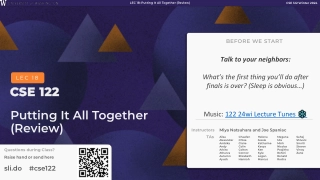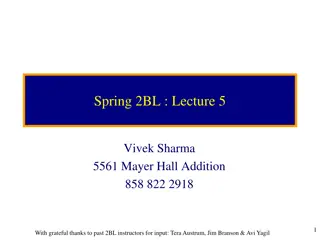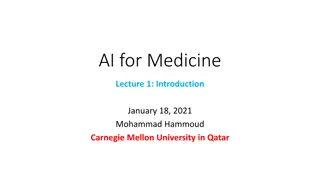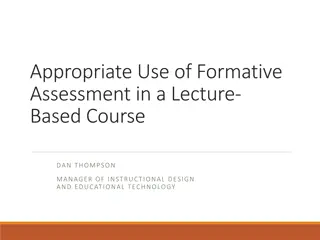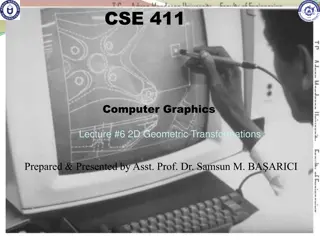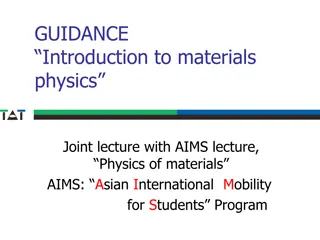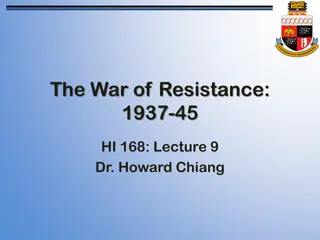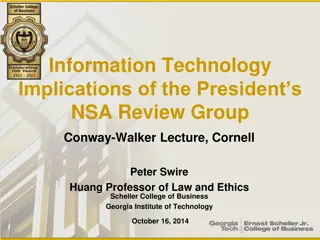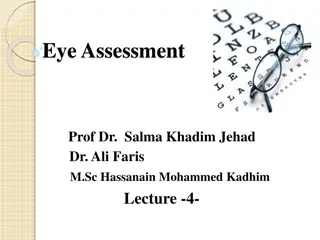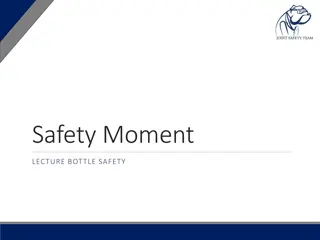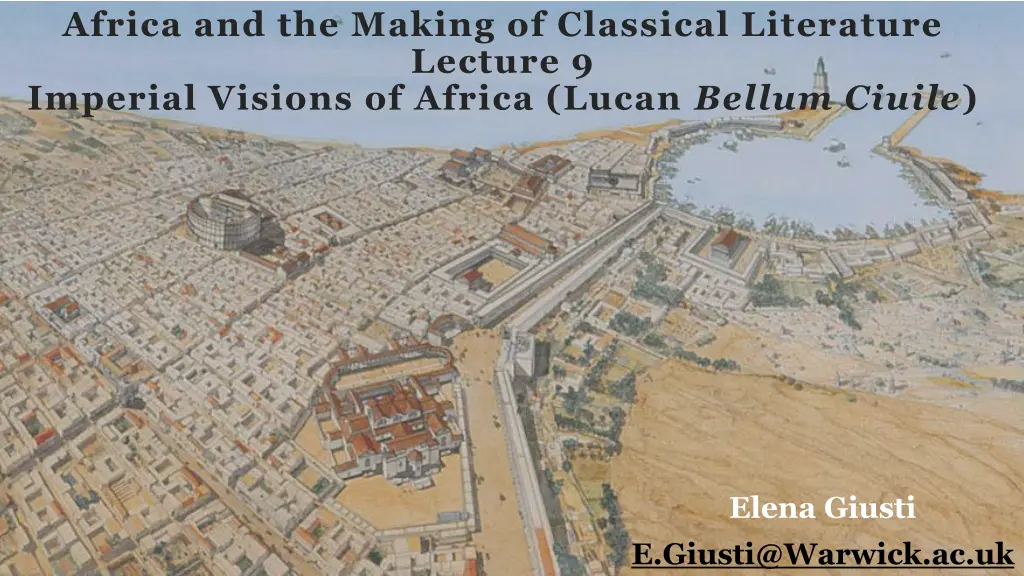
Lucan's Bellum Ciuile: Imperial Visions of Africa in Classical Literature
Explore the life and works of Marcus Annaeus Lucanus, focusing on his epic poem "Bellum Ciuile" which delves into the war between Julius Caesar and Pompey. Discover Lucan's complex relationship with Nero, Pompey, and Cato, and the anti-heroic, rhetorical style of his unfinished masterpiece. Dive into the vivid imagery and themes of power, loyalty, and mortality in Lucan's work.
Download Presentation

Please find below an Image/Link to download the presentation.
The content on the website is provided AS IS for your information and personal use only. It may not be sold, licensed, or shared on other websites without obtaining consent from the author. If you encounter any issues during the download, it is possible that the publisher has removed the file from their server.
You are allowed to download the files provided on this website for personal or commercial use, subject to the condition that they are used lawfully. All files are the property of their respective owners.
The content on the website is provided AS IS for your information and personal use only. It may not be sold, licensed, or shared on other websites without obtaining consent from the author.
E N D
Presentation Transcript
Africa and the Making of Classical Literature Lecture 9 Imperial Visions of Africa (Lucan Bellum Ciuile) Elena Giusti E.Giusti@Warwick.ac.uk
MARCUS ANNAEUS LUCANUS Born in 39 CE at Corduba (modern C rdova) in Spain. Son of Annaeus Mela and Acilia; Annaeus Mela was the son of Seneca the Elder, brother of Seneca the Younger. He was educated at Rome by Lucius Annaeus Cornutus (also praeceptor of the satirist Persius) and introduced to Stoic philosophy. In 60 CE he was made quaestor and augur by Nero before his time; in the same year he performed a panegyric for Nero (Laudes Neronis) at the Neronia (a quinquennial festival for poetry, music and rhetorics instituted by Nero in 60 CE). He was the first prize. In the following years he gave published recitations of his Bellum Ciuile. Bust of Lucan from C rdova
MARCUS ANNAEUS LUCANUS Following his success, Nero banned Lucan from public recitation of his poetry. In 65 CE Lucan joined the Pisonian Conspiracy and commited suicide when the conspiracy was discovered. Tacitus Annals 15.70: When his blood was flowing, and he felt his feet and hands chilling and the life receding little by little from the extremities, though the heart retained warmth and sentience, Lucan recalled a passage in his own poem, where he had described a wounded soldier dying a similar form of death, and he recited the very verses.Those were his last words. Lucan left his epic poem, the Bellum Ciuile or Pharsalia, unfinished, in 10 books. It covers the war between Julius Caesar and Pompey, in the years 49-48 BCE. We have notice of a number of other minor works that have not survived. Bust of Lucan from C rdova
PHARSALIA NOSTRA O sacer et magnus vatum labor! omnia fato eripis et populis donas mortalibus aevum. Invidia sacrae, Caesar, ne tangere famae; nam, si quid Latiis fas est promittere Musis, quantum Zmyrnaei durabunt vatis honores, uenturi me teque legent;Pharsalia nostra vivet, et a nullo tenebris damnabimur aevo. O how sacred and immense the task of bards! You snatch everything from death and to mortals you give immortality. Caesar, do not be touched by envy of their sacred fame; since, if for Latian Muses it is right to promise anything, as long as honours of the Smyrnaean bard [i.e. Homer] endure, the future ages will read me and you; our Pharsalia shall live and we shall be condemned to darkness by no era. Lucan BC 9.980-6
10 BOOK (/12?) EPIC Starts with the causes of the war, praise (?) to Nero, Caesar s crossing of the Rubicon (49 BCE). Pompey s defeat at Pharsalus (48 BCE) is narrated in Book 7. Ends in Book 10 with Caesar at the court of Cleopatra. Would have ended perhaps with Cato s death at Utica (46 BCE), the Ides of March (44 BCE) or even the battle of Actium (31 BCE). Viewed by many as anti-Aeneid(may have followed Virgil s 12-book structure): gloomy, gory, anti-heroic, rhetorical and highly stylized. Scholarly divide: Lucan s questioned loyalty to Nero, Pompey, and even Cato. Scholarly divide: Lucan the Partisan vs Lucan the Nihilist.
WARS MORE THAN CIVIL Bella per Emathios plus quam civilia campos, iusque datum sceleri canimus, populumque potentem in sua victrici conversum viscera dextra, Cognatasque acies, et rupto foedere regni Certatum totis concussi viribus orbis in commune nefas, infestisque obvia signis signa, pares aquilas et pila minantia pilis. Of wars across Emathian plains, worse than civil wars, and of legality conferred on crime we sing, and of a mighty people attacking its own guts with victorious sword-hand, of kin facing kin, and, once the pact of tyranny was broken, of conflict waged with all the forces of the shaken world for universal guilt, and of standards ranged in enmity against standards, of eagles matched and javelins threatening javelins. LUCAN BC 1.1-7
WARS MORE THAN CIVIL Epode 7.5-10 non, ut superbas invidae Carthaginis Romanus arces ureret, intactus aut Britannus ut descenderet Sacra catenatus Via, sed ut secundum vota Parthorum sua urbs haec periret dextera? not to enable the Roman to burn the arrogant stronghold of jealous Carthage, or to make the Briton, so long beyond our reach, walk down the Sacred Way in chains, but to ensure that in answer to the Parthians prayers this city shall perish by its own hand? Dido s Curse (Aen.4.628-9) litora litoribus contraria, fluctibus undas imprecor, arma armis;pugnent ipsique nepotesque. Shores against shores, waters against waters this I pray, weapons against weapons: let them fight, they themselves, and their descendants.
AFRICAN MANES Horace Ode 2.1.25-8 (Ode to Asinius Pollio) Iuno et deorum quisquis amicior Afris inulta cesserat impotens tellure victorum nepotes rettulit inferias Iugurthae. Juno, with the other deities more friendly to the Africans, had withdrawn powerless, leaving the country unavenged, but now they have offered as a sacrifice to the dead Jugurtha the grandsons of his conquerors. Lucan 1.39 Poeni saturentur sanguine manes, let the shades of the Carthaginians be glutted with blood ; 4.789 90ferat ista cruentus | Hannibal et Poeni tam dira piacula manes, let bloody Hannibal and his Punic shades accept this dreadful expiation Metellus Scipio s death: offer of a Scipio to the Carthaginians unsated thirst for vengeance exactly 100 years after the destruction of Carthage, at the battle of Thapsus (146 BCE 46 BCE): Lucan 6.309 11 nec Iuba Marmaricas nudus pressisset harenas | Poenorumque umbras placasset sanguine fuso | Scipio, the naked body of Iuba would never have fallen on Marmaric sands and Scipio would not have placated the Punic shades by spilling his blood , and 6.788 9 deplorat Libycis perituram Scipio terris | infaustam subolem, Scipio grieves that his wretched progeny should die on Libyan land .
AFRICA AND EGYPT IN THE PHARSALIA Curio in Africa against king Juba (read Lucan 4.582-824) Pompey s death in Egypt (read Lucan 8.456-872) Cato s march through the desert (read Lucan 9.294-949) Caesar at the court of Cleopatra (read Lucan Book 10) NB For a good translation + notes, please use the Oxford Scholarly Edition of Susan Braund: http://webcat.warwick.ac.uk/search~S1?/Xbraund+lucan&searchscope=1&SORT=D/Xbraund+lucan& searchscope=1&SORT=D&SUBKEY=braund+lucan/1%2C11%2C11%2CB/frameset&FF=Xbraund+luc an&searchscope=1&SORT=D&5%2C5%2C
CURIO IN AFRICA AGAINST KING JUBA C. Scribonius Curio (84-48 BCE) initially a supporter of Pompey, but switched his allegiance to Caesar in 50. He is sent to Africa in 49 BCE to fight King Juba I of Numidia (supporter of Pompey). Juba I of Numidia (85-46 BCE) was the son and successor of Hiempsal II (son of Gauda, Jugurtha s half-brother, who reigned from 105 BCE). In 81 BCE Hiempsal II had been driven from his throne and was reinstated by Pompey; since then, Hiempsal and later Juba became Pompey s allies. On his visit to Rome, Juba was insulted by Caesar, who pulled his beard, and by Curio, who proposed that Numidia should be sold privately. Lucan 4.691-2 Curio temptarat Libyamque auferre tyranno, / dum regnum te, Roma, facit Curio had tried to steal Libya from its tyrant, while he makes you, Rome, into a kingdom! Curio is defeated by Juba and dies on the field: Lucan 4.809-10 Libycas, en, nobile corpus, / pascit aves nullo contectus Curio busto, Look! Curio, a noble corpse, covered by no tomb, feeds the birds of Libya.
CURIO IN AFRICA (4.582-824) 581-660 Curio arrives at the river Bagrada (near Utica) and asks why the region was called the kingdom of Antaeus . He is told by a local man the sotry of the fight (wrestling match) between Hercules and the giant Antaeus [seminar]. 661-714 Curio defeats the Pompeian commander Varo at Utica. 715-798 Curio is tricked and defeated by Juba and kills himself (cf. Caesar BC 2.38-43) 799-824 Lucan s address to Curio
JUBAS LAND Lucan 4.670-5 Non fusior ulli terra fuit domino: qua sunt longissima, regna cardine ab occiduo vicinus Gadibus Atlas terminat, a medio confinis Syrtibus Hammon; at, qua lata iacet, vasti plaga fervida regni distinet Oceanum zonaeque exusta calentis. No master had a broader land: where his realm is longest it is bounded at the western point by Atlas, near to Gades, on the middle line by Ammon, next to the Syrtes; but where its breadth extends, the burning tract of his vast kingdom keeps apart the Ocean and the parched hot zone.
JUBAS TROOPS Lucan 4.676-86 The great area is matched by its peoples, so many follow his camp: the Autololes, wandering Numidians, Gaetulians always ready for action on undecorated horse; next Moors as dark as Indians, poor Nasamonians, swift Marmaridae with sun-scorched Garamantes, the Mazaces rivalling the Medes arrows when they shoot their quivering missiles, and the Massylian race who ride bare-back and with light stick guide mouths unacquainted with the bit, and the Arzucian hunter who often roams through empty huts and covers furious lions with his flowing clothes as soon as confidence in his weapon is gone. Sufficiunt spatio populi: tot castra secuntur, AutololesNumidaeque vagi semperque paratus inculto Gaetulus equo, tum concolor Indo Maurus, inops Nasamon, mixti Garamante perusto Marmaridae volucres, aequaturusque sagittas Medorum, tremulum cum torsit missile, Mazax, et gens quae nudo residens Massylia dorso ora levi fiectit frenorum nescia virga, et solitus vacuis errare mapalibus Afer [or Arzux] venator, ferrique simul fiducia non est, vestibus iratos laxis operire leones.
JUBAS GUILE Juba is afraid that enemy will retreat if they hear of his approach, so he sends ahead Sabbura, his second in command. He waits with his forces in a valley Lucan 4.724-9 [Juba the Mongoose] Just so are Pharian asps deceived by their cleverer enemy with his tail; he angers and provokes them with the shifting shadow and when the serpent stretches out into empty air, his head aslant he grabs its throat with bite safely short of the deadly venom; then the bane without effect is squeezed out and its jaws run with wasted poison. Aspidas ut Pharias cauda sollertior hostis ludit et iratas incerta provocat umbra obliquusque caput vanas serpentis in auras effusae tuto conprendit guttura morsu letiferam citra saniem; tunc inrita pestis exprimitur, faucesque fluunt pereunte veneno. 735-7 multum frustraque rogatus, ut Libycas metuat fraudes infectaque semper Punica bella dolis. they (Curio s men) begged him to be in fear of Libyan tricks and Punic warfare always tainted by deceit.
A SACRIFICE TO HANNIBALS MANES Lucan 4.788-793 Excitet invisas dirae Carthaginis umbras inferiis Fortuna novis, ferat ista cruentus Hannibal et Poeni tam dira piacula manes, Romanam, superi, Libyca tellure ruinam Pompeio prodesse nefas votisque senatus! Africa nos potius vincat sibi. Let Fortune call up grim Carthage's hated ghosts with these new offerings, let blood- stained Hannibal and the Punic shades accept this grim expiation. It is a crime, gods, that Roman ruin on the earth of Libya helps Pompey and the Senate's prayers! Better that Africa should conquer us for herself.
LUCANS SALLUSTAN, BUT ANTI- CAESARIAN ENDING Lucan 4.816-24 As it was, depraved ages damaged Rome, once ambition, luxury, and the dreaded power of wealth had carried off his wavering mind with sideways current; and won over by Gallic booty and Caesar's gold, the altered Curio turned the balance of events. True, mighty Sulla and fierce Marius and bloody Cinna and the chain of Caesar's house created for themselves the power of the sword over our throats. But who was ever granted such great power as he? They all bought, but he [Curio] sold Rome [to Caesar]. perdita tunc urbi nocuerunt saecula, postquam ambitus et luxus et opum metuenda facultas transverso mentem dubiam torrente tulerunt; Momentumque fuit mutatus Curio rerum Gallorum captus spoliis et Caesaris auro. ius licet in iugulos nostros sibi fecerit ensis Sulla potens Mariusque ferox et Cinna cruentus Caesareaeque domus series, cui tanta potestas concessa est? emere omnes, hic vendidit urbem.
CATO IN AFRICA (9.294-949) 294-347 From Cyrene, Cato decides to go to king Juba, but the Syrtes are an obstacle; description of the Syrtes; a storm destroys some of the ships (cf. Apollonius Rhod. 4.1240-9); part of the fleet arrives at the marshes of lake Triton. 348-67 legends connected with lake Triton (seminar) 368-410 Cato decides to go around the Syrtes by land, and he exhorts his men with a speech. 411-510 Description of Libya and its hazards. 511-604 Temple of Jupiter Ammon; Labienus asks Cato to consult the oracle but he declines; 604-699 Origin of the African snakes: the story of Medusa. 700-889 Catalogue of African Snakes + the march through the snakes. 890-937 the Psylli, a local people, help the troops (seminar). 938-49 Cato and his men arrive at Leptis.
LIBYA AS EXPIATION Lucan 9.382-5 [Cato s speech] Vadimus in campos steriles exustaque mundi, qua nimius Titan et rarae in fontibus undae, siccaque letiferis squalent serpentibus arva. Durum iter ad leges patriaeque ruentis amorem. We march towards the barren plains and burnt-up places of the world where Titan is excessive and waters scarce in springs, where dry fields are caked with deadly snakes. Hard is the path towards legality and love of crashing fatherland. 405-6 sola potest Libye turba praestare malorum, ut deceat fugisse viros. Libya alone with its brood of evils can show that it is honourable for warriors to have fled.
UNCORRUPTED LIBYA 9.411-13 Tertia pars rerum Libye, si credere famae cuncta velis; at, si ventos caelumque sequaris, pars erit Europae. The third part of the world is Libya, if you want to trust in rumour altogether; but, if you go by winds and sky, it will be a part of Europe. 424-8 in nullas vitiatur opes; non aere neque auro excoquitur, nullo glaebarum crimine pura et penitus terra est. Tantum Maurusia genti Robora divitiae, quarum non noverat usum, sed citri contenta comis vivebat et umbra. For no riches is it harmed; not for bronze and not for gold is it melted; pure and faultless in its soil, it is earth to the core. The people's only source of riches is Maurusian timber: its benefit they did not know but lived content with foliage and shade of the citrus-tree. 435-7 Temperies vitalis abest, et nulla sub illa cura Iovis terra est; natura deside torpet orbis et inmotis annum non sentit harenis. The mild climate needed for life is missing and down in that land there is no concern for Jupiter; the zone is inert with nature sluggish and it does not feel the seasons on its unploughed sands.
TEMPLE OF JUPITER AMMON (NB NOT TECHNICALLY EN ROUTE) Luc. 9.511-21 They had come to the temple, the only one among the Libyan tribes which the rough Garamantians possess. There stands the oracle-giver, Jupiter, as tradition says, but not shooting thunderbolts or like our own, but Ammon with his twisted horns. There the Libyan tribes have not put wealthy temples, and treasure-chambers are not bright with eastern gems. Although for peoples of the Ethiopians and wealthy tribes of Arabs and the Indians, Jupiter Ammon is the only god, still he is poor and occupies a shrine profaned through ages by no wealth and, a deity of the ancient ways, he defends his temple against Roman gold. Ventum erat ad templum, Libycis quod gentibus unum inculti Garamantes habent. Stat sortiger illic Iuppiter, ut memorant, sed non aut fulmina vibrans aut similis nostro, sed tortis cornibus Hammon. Non illic Libycae posuerunt ditia gentes templa, nec Eois splendent donaria gemmis. quamvis Aethiopum populis Arabumque beatis gentibus atque Indis unus sit Iuppiter Hammon, pauper adhuc deus est nullis violata per aevum divitiis delubra tenens, morumque priorum numen Romano templum defendit ab auro.
PEOPLE OF LIBYA Luc. 9.438-44 Hoc tam segne solum raras tamen exerit herbas, quas Nasamon, gens dura, legit, qui proxima Ponto nudus rura tenet; quem mundi barbara damnis Syrtis alit. Nam litoreis populator harenis inminet et nulla portus tangente carina novit opes; sic cum toto commercia mundo naufragiis Nasamones habent. This soil so inactive yet sends up infrequent grasses which the hardy race of Nasamonians collect, who, naked, occupy the fields closest to the sea and are fed by the savage Syrtes on the losses of the world. For on the sea-shore's sands the plunderer lies in wait and, though no vessel touches harbour, with wealth he is familiar: in this way the Nasamonians trade with the entire world, in shipwrecks. 458-60 Regna videt pauper Nasamon errantia vento discussasque domos, volitantque a culmine raptae detecto Garamante casae. The impoverished Nasamonian sees his kingdom floating in the wind, his home pulverized; the cottage flies away, torn off roof first, uncovering the Garamantian.
THE SNAKES Catalogue of snakes (700-733), starting with the Asp and ending with the Basilisk, the king (basileus) of the snakes. The snakes themselves are implicated in civil war and in the general degeneration of Rome: 9.706-7 sed (quis erit nobis lucri pudor?) inde petuntur / huc Libycae mortes et fecimus aspida mercem, shall we ever feel ashamed of gain? from there to here are brought the Libyan deaths and we have made the Asp a commodity. 9.850 Pro Ccaesare pugnant / dipsades et peragunt civilia bella cerastae, In place of Caesar, Dipsads fight; Cerastae finish off the civil war.
THE DEATH OF POMPEY (8.456-72) Following his defeat at the battle of Pharsalus (48 BCE), Pompey does not know where to go. He does not trust Juba, and proposed going to Parthia, but Lentulus opposes the idea and suggests Egypt instead Egypt is currently ruled by the boy-king Ptolemy XIII. Aulus Gabinius, a supported of Pompey, had restored Ptolemy XII Auletes to the throne of Egypt in 55 BCE. Pompey was appointed guardian of the boy. In 50 BCE, Ptolemy XIII and his older sister Cleopatra VII were promoted as coruler, with the eunuch Pothinus acting as regent for Ptolemy. In 48 BCE, Ptolemy XIII and Pothinus deposed and exiled Cleopatra, but she soon organized her army. She will be restored to the throne with the support of Caesar. When Pompey arrives in Egypt, Pothinus has him executed as a trophy for Caesar.
LENTULUS WISHFUL THINKING Lucan 442-53 [Lentulus] si regna times proiecta sub Austro infidumque Iubam, petimus Pharon arvaque Lagi. Syrtibus hinc Libycis tuta est Aegyptos; at inde Gurgite septeno rapidus mare summovet amnis. Terra suis contenta bonis. non indiga mercis aut Iovis; in solo tanta est fiducia Nilo. Sceptra puer Ptolemaeus habet tibi debita, Magne, tutelae commissa tuae. Quis nominis umbram horreat? innocua est aetas. Ne iura fidemque respectumque deum veteri speraveris aula: nil pudet adsuetos sceptris; mitissima sors est regnorum sub rege novo. if you fear the realms extending to the south and treacherous Juba, we make for Pharos and the lands of Lagus. On one side Egypt is protected by the Libyan Syrtes, on the other side the rapid river with its sevenfold flood drives back the sea. The land is satisfied with its own blessings and has no need of trade or Jupiter; all its confidence is in Nile alone. The sceptre which boy Ptolemy holds he owes to you; it was entrusted to your guardianship. Who would shudder at the shadow of a name? [expression used for Pompey at 1. 135] His age is innocent. Justice, loyalty, regard for the gods do not look for these in an aged court; nothing shames men grown accustomed to the sceptre: mildest is the lot of realms beneath a new king.'
DECADENT EGYPT (CLEOPATRAS BANQUET FOR CAESAR) Lucan 10.155-171 They poured the banquet on to gold what land, what air, what sea and Nile supplied, what luxury, made mad by empty ostentation, sought through all the world without hunger's command; they served many birds and many beasts the gods of Egypt, and crystal-ware provides Nile water for their hands, and huge jewelled cups received the wine, but not of Mareotic grape, but noble, fierce Falernian which Mero had aged in not many years, compelling it to foam. They put on garlands twined with flowering nard and never-failing rose, and on to their dripping locks they poured much cinnamon whose scent had not yet faded and which had not lost its flavour in a foreign country and cardamom brought fresh from nearby harvest. Caesar learns to squander the riches of a plundered world; it shames him to have waged a war against his impoverished son-in-law and he prays for pretexts to fight the Pharian peoples.
READ FOR NEXT WEEKS SEMINAR Alexander the Great 8.692-99, 10.1-52 Cleopatra 10.53-154

